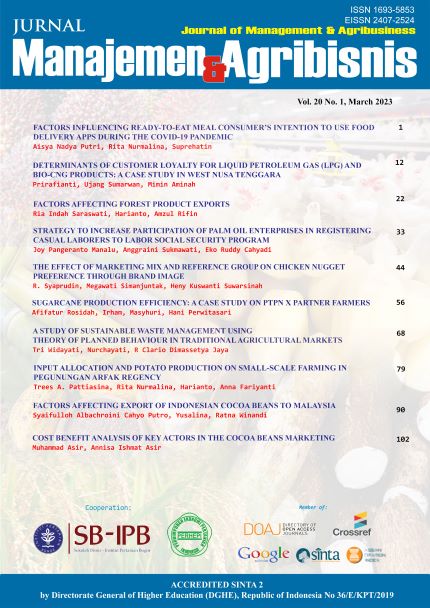Harmonization of Rice Production Policy and Rice Trade Policy in Indonesia
Abstract
Indonesia is the world's fourth most populous country, trailing only China, India, and the United States, with a population of 276,361,788 people. Efforts to fulfill the demand for rice as a staple food are concerning. The policies established by the Ministry of Agriculture and the Ministry of Trade do not match. The Ministry of Agriculture carries out a pro-rice production policy. The Ministry of Trade carries out a pro-rice import policy. This study included both descriptive and quantitative analysis. The type of data used in this research is annual time series secondary data with a research period from 1980 to 2020. The model used in this study was developed using the Two Stage Least Squares (2SLS) approach. The results showed that the Ministry of Agriculture's goal was to boost output, but this might lead to overstock and consequently reduce rice prices, according to the Ministry of Trade. The Ministry of Trade's rice import policy has always been withheld by the Ministry of Agriculture because, according to the Ministry of Agriculture, imports will lower the rice price, reducing farmers' income. This shows that production and trade policies are not well-suited. Production policies, with an average annual increase of 2%, outperform trade policies, with an average annual increase of 141%.
Keywords: rice, food, production policy, trade policy, harmony
Authors
Authors who publish with this journal agree to the following terms:
- Authors retain copyright and grant the journal right of first publication with the work simultaneously licensed under a Creative Commons Attribution License that allows others to share the work with an acknowledgement of the work's authorship and initial publication in this journal.
- Authors are able to enter into separate, additional contractual arrangements for the non-exclusive distribution of the journal's published version of the work (e.g., post it to an institutional repository or publish it in a book), with an acknowledgement of its initial publication in this journal.
- Authors are permitted and encouraged to post their work online (e.g., in institutional repositories or on their website) prior to and during the submission process, as it can lead to productive exchanges, as well as earlier and greater citation of published work (See The Effect of Open Access).

